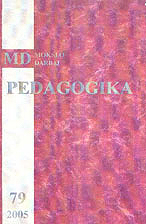Mokyklos pasirinkimo galimybės
The Possibilities of the School Choice
Author(s): Ramutė Kučinskienė , Liudmila RupšieneSubject(s): Education
Published by: Vytauto Didžiojo Universitetas
Keywords: school choice; possibilities
Summary/Abstract: Due to the democratization and diversification occurring in educational systems, a heterogeneous market of educational services is being formed. A reasonable and logical conclusion of the establishment of market relations in education is the expansion of the variety of suggested to choice of educational services. Therefore, one of the most distinct trends in the educational policy in the USA and many countries of Western Europe during the last two decades has been expanding of possibilities to choose a school. Parents and children are acquiring more and more opportunities to choose educational programs, satisfying their needs best, as well as institutions, realizing such programs, and they willingly use such their rights. During the years of Soviet occupation in Lithuania choosing a school and/or transitioning from one school to another were not automatic, but rather a privilege for “the chosen ones”. The situation started to change after restoration of independence in 1990. The Law on Education of the Republic of Lithuania adopted in 2003 secured the right of students and their parents to choose not only an educational program, but also an educational institution, providing it. Hence, choosing a school is quite a new problem for scientific research and educational practice in Lithuania. In this study we aimed at revealing of opportunities to choose a school in present day Lithuania and the reasons for making such a choice. The study revealed that the majority of the students, who transitioned from one school to another in 2003, chose their new schools either themselves or together with their parents. The higher the grade, where students study, the more they tend to choose the further studying institution themselves. Students’ independence when choosing a school increases with every school transition. Almost all 11–12 grade students, participating in the research, stated that they had chosen their school themselves. Students, residing in large cities, had more opportunities to choose a school, however, in some cases urban respondents stated they had no opportunity to choose a school. When choosing a school influence of better-educated parents is more considerable, moreover, children of such parents more rarely state that they did not have an opportunity to choose a school. However, differences in evaluation of opportunities to choose a school are not very considerable as regards educational stages, children of more or less educated parents and urban / rural residents. We suppose that it is reasoned by the process of forming of the market of educational institutions, which have recently begun in Lithuania. Differences between types of schools and separate institutions are mostly not very discriminating. Information and guidance system for students and their parents about peculiarities of various institutions according to certain students’ needs has not been created.
Journal: Pedagogika
- Issue Year: 2005
- Issue No: 79
- Page Range: 110-115
- Page Count: 6
- Language: Lithuanian

